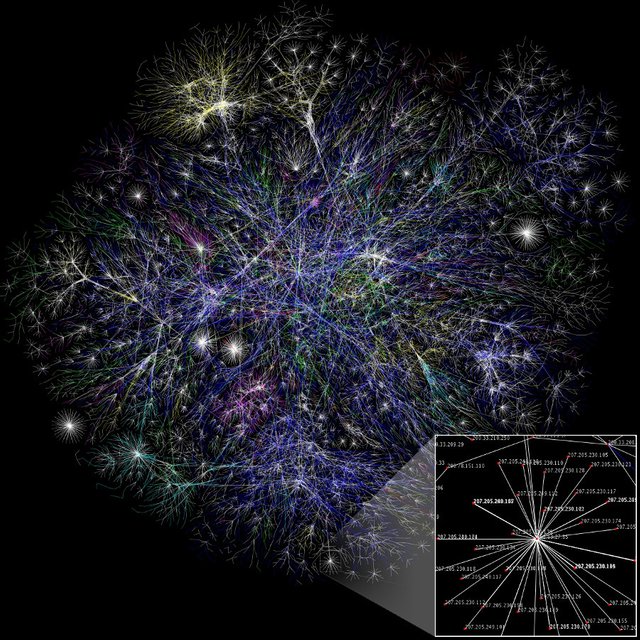CICADA And The Elimination Of Government
I was never attracted to the combination of anarchism and capitalism, for a large part because of the very individualistic nature of it's foundations, when I see our western societies suffer from too much social atomism already.

source: CICADA
Atomism or social atomism is a sociological theory arising from the scientific notion atomic theory, coined by the ancient Greek philosopher Democritus and the Roman philosopher Lucretius. In the scientific rendering of the word, atomism refers to the notion that all matter in the universe is composed of basic indivisible components, or atoms. When placed into the field of sociology, atomism assigns the individual as the basic unit of analysis for all implications of social life.
source: Wikipedia
It is one of my deepest beliefs that today's exaggerated focus on individualism, cultivated by economically motivated for profit institutions, is for a large part responsible for the many forms of extreme polarization present in modern societies and discourse. In times where the mere mention of something basic, like we should take care of the unfortunate, the sick, the old, the poor, is likely to get you called a communist, any ideology that amplifies the stupid illusion of individuals being truly independent cannot count on my support. There's too much of that blaming the victim already.
I'm fully aware that my gripes are directed against capitalism's individualistic nature first and foremost. I have nothing against the anarchist's wish to get rid of the institutionalized nature of government and authority, on the contrary. But I do have a problem with their general tendency to hail free markets as some kind of cure for, or safeguard against the centralization of power.
But once in a while I get surprised in a very pleasant way. Yesterday evening I had this wonderful discussion with a voluntarist called @zoidsoft, a great fellow steemian who I'm very glad to have met. I think our discussion was a perfect example of how meaningless and downright confusing labels can sometimes be; I shouldn't even have called him a voluntarist. He's @zoidsoft and he is just a kind and good person, and I believe we both ultimately strive for something very similar. You can read the discussion in the comments here.
After an evenings discussion about some very fundamental things, like our society, politics and economy, @zoidsoft cleared some things up for me and gave some very nice and useful links. And these links opened up my eyes to the real possibility for us to eliminate the biggest institute of centralized power; the government.
The reasons why I believed some sort of government is always necessary you can read in the discussion @zoidsoft and I had. But he brought our viewpoints miles closer together when he made me realize an important distinction, namely between government and governance. Government in a representative democracy has a lot of weaknesses and many of those are because of centralization.

The connections and pathways of the internet could be seen as the pathways of neurons and synapses in a global brain
source: Wikipedia
In all of my writings there's a strong belief present about our interdependence as individuals, and I have always renounced pure capitalism as a valid and working economical model because it contradicts the basic truth of that interdependence in every way. And it still does of course; there's still no magical "invisible hand" that will somehow steer market-forces toward some equilibrium where everyone gets what they deserve. And that's why I just can't see anything good coming from the anarchist's notion of abolishing government or any authority combined with a prehistoric "survival of the fittest" scarcity based mindset. Similarly, the enforced equilibrium like in communism is not realistic. A "visible hand" is just as unwanted as it's invisible counterpart.
I never imagined a direct democracy was even possible on scales needed for a globally interconnected and interdependent citizenship. And no one wants a one world order under a centralized one world government; representative forms of democracy stop working beyond a certain size; just look at the completely failed EU... No one wants a New World Order :-)
So @zoidsoft gave me a link to CICADA. I must admit I've been lazy lately where it comes to following the developments in the cryptoverse, and I apparently missed some :-( But CICADA's claims are as impressive as they are encouraging: they call it a "distributed direct democracy (DDD)". I'll just quote some of the introduction of the whitepaper under the heading "Motivation".
A true Direct Democracy (DD) requires representativeless government. The concept is so new that the word representativeless does not even exist. We had to invent it. Think of a digital DD as true algorithmic government. It holds the potential to unleash the true will of the people, while being a natural evolution from current governmental systems. While Direct Democracies have been tried in the past, in limited scope, such as in Athens and pre-republic Rome, there was simply no practical way to make such a system work with pure analog technology. A Direct Democracy absolutely requires mass communication and digitization and it almost certainly requires Artificial Intelligence.
In its idealized state, a Direct Democracy is self organizing, self-booting, self-replicating system that provides, instantiates and automates all functions of government. It is able to sustain itself indefinitely, provided sufficient communications infrastructure still exists within the country or sufficient client devices still exist to power a mesh network. Creating such a platform may take ten years. It will require cutting edge programming, critical thinking, and a willingness to solve a string of currently unsolved problems. But the potential rewards are vast and manifold, easily making it worth the huge engineering effort required to make it a reality.
The next time there is an Arab Spring, the people will be able to replace their leaders with code.

Democracy - source: Picpedia
Keep in mind that many problems still have to be solved before the "idealized state" of this direct democracy can be realized. One of the most important things is mentioned in another great reference I got from @zoidsoft, an article by @taskmaster4450: EOS Providing A Basic Income?. I advice everyone to read that entire article and give it an upvote, but here's the most important hurdle to overcome for a distributed direct democracy on the blockchain:
The challenge is, like all blockchains are experiencing, how do you prove that a person is who he or she claims? And how do you prevent someone from creating multiple accounts to tap into more of the resource base. @actifit is already dealing with this, having to ban about 20 accounts for trying to game the system.
Fortunately, when reading through the rest of the not too technical stuff from the CICADA whitepaper, they really are going about this project very cautiously and seriously and already show some ways of protecting against various threats to the decentralized nature of the Dapp.
This, of course, creates a number of new challenges, such as driving voter participation, avoiding voter fatigue, and dealing with the average voter's imperfect understanding of essential issues. There is also the problem of preventing the system from being overwhelmed by irrelevant, impractical, or disingenuous proposals, an issue which plagues existing frameworks such as California's ballot primary system or the UK government's petition website.
A later section addresses many of these issues via automated voting, gamification of voting, and the ability to call expert private groups to create fast tracked proposals for complex topics such as economics, technology, and the sciences, rather than relying on politicians with no experience or meaningful understanding these disciplines. We will also provide a filtration system that dramatically limits the amount of proposals presented to the entire nation for voting, ensuring only the cream rises to the top.
By contrast, a Direct Democracy creates a powerful framework for continuous voting that reflects the changing will of the people, exactly as they intend. While there are certainly challenges and weaknesses to solve for in this type of system, we believe the system can be crafted in such a way that it will be strongly resistant to distortions while providing powerful checks and balances at an algorithmic level, making it less prone to subversion when elected representatives decide to erode or ignore constitutional and legal checks and balances on their power for personal gain.

U.S. Declaration of Independence
Image by Democracy Chronicles - source: Flickr
One of the most innovative ideas I've seen is their intention to eliminate the split between miners and clients/users. In their proposed architecture every user of the blockchain becomes a miner in a delegated Proof of Work secured blockchain. And each user, and thus miner, must be unique so they link the Human Unique Identifier to the Node-id of the miner. With enough participation such an architecture should also arrest centralization through the ASIC (Application-Specific Integrated Circuit) Race, the power of the manufacturers of mining machines like Bitmain.
The fact that every user becomes a miner also implies that CICADA will be able to provide for a Universal Basic Income! This would go a long way in solving the poverty caused by capitalism's natural tendency to grow the gap between rich and poor. Imagine a world where we don't longer have to worry about obtaining the most basic needs to survive or have a normal life. Imagine how much of the wasted spiritual and mental energy will be gained for creativity instead of worrying.
This kind of direct democracy is also in line with the need for increased personal responsibility that's needed for any democracy to work. We will continuously be voting on any idea proposed. Although aided by AI, this demands from each of us that we be informed on anything we actively cast our vote for. I like the idea that taking responsibility for your own money, as expressed through the architecture of the distributed blockchain technology, is now being combined with taking responsibility for our own community through that exact same architecture.
I've just started to investigate this and although I'm very impressed, this is NOT financial advice. Nor is it lifestyle advice or political advice. It's just me sharing what I've learned so far and to the best of my capabilities. Like in my discussion last night, I'm always open to learn, so I'd love to hear your opinion on this. Here are some nice slogans of what CICADA hopes to offer:
- CICADA: Rebooting Democracy before it's too late
- Replace your leaders with code
- What if you could run the world from any device?
- Smash Big Brother
- Delivers anonymous, un-riggable, end-to-end verifiable voting
- Delivers a practical Universal Basic Income (UBI)
- Automatically battles DDoS attacks
- Decentralizes DNS
- The Internet We Always Wanted
- Ends the centralization of mining
- Survives even if the internet goes down

Cicada - source: Public Domain Files
This will all take time still; remember they mentioned a period of 10 years in the whitepaper, and I'm not exactly sure how long ago this project started, but the whitepaper dates back to 2016. Here's it's conclusion:
Both decentralized application platforms and distributed direct democracies present numerous complex and multifaceted design problems. They require novel solutions to existing problems and solutions to previously unsolved problems. This white paper is by no means an exhaustive exploration of the concept. It is merely a starting point for considering how people would begin to build such a technology platform.
We're not there yet! This humongous project, well humongous in it's possible implications anyway, is in a fledgling state. It got me interested enough though to read some articles on Medium by the whitepaper's author, Daniel Jeffries. Reading his comments and ideas about EOS in which he is both supportive and critical about that project, to the point that he even describes how he exited the ICO before regaining trust later, has re-enforced the idea that his project CICADA is deserving of our attention and support; I really like how his brain works, so to speak. Here's his take on the importance of free transactions:
If the apps of the future require someone to go to an exchange, sign up, get KYCed, learn about wallets, wire in fiat, buy crypto and download crypto to an app all before they do a damn thing with that app it will never, ever, ever, ever happen.
That's exactly why Dapps are the best chance at mass adoption of blockchain-technology and crypto-currencies; their ability to take away a HUGE point of resistance for non-geeks to join our free world.
A random quote from his article How Your Relationship With Money Secretly Sabotages You and How to Fix It:
You see, there are really two paths to money:
- The path of selfishness.
- The path of creating value for others.
Only the second path is worth it.

Image by Clker-Free-Vector-Images - source: Pixabay
See, these things make me want to trust this project. But I also realize that I'm no programmer like @dan or @zoidsoft, so I'm aware of the possibility that I'm misinterpreting or not understanding all of the stuff I read. So if any of you would like to add something to, or correct something what I wrote here, please don't hesitate. Also, I know that Daniel Jeffries is still active on Medium and that he's recently started a podcast called the Daily Posthuman, but I'm not at all aware of the latest developments in the CICADA project; maybe some of you can shed some light on this.
If you want to read a short one page introduction of CICADA, read the CICADA onepager on their Github.
So, in closing I'd like to repeat that this is not advice of any kind. Also I'd like to thank @zoidsoft for pointing me to all this information and our discussion last night. I don't want to forget @taskmaster4450 and thank him for all he does with the Universal Basic Income project he's working on. And I want to thank you, dear reader, for visiting my blog. I'll be back tomorrow (if Steemit is up and running), and hope you'll be here too. Until then, keep learning and keep steeming!

Recent articles you might be interested in:

Thanks for stopping by and reading. If you really liked this content, if you disagree (or if you do agree), please leave a comment. Of course, upvotes, follows, resteems are all greatly appreciated, but nothing brings me and you more growth than sharing our ideas. It's what Steemit is made for!


Just for Full Disclosure, I'm invested in these crypto-currencies:
Bitcoin | Litecoin | EOS | OmiseGo | FunFair | KIN | Pillar | DENT | Polymath | XDCE | 0x | Decred | Ethereum | Carmel | XYO
Hi Winston. Glad I found you. You look after yourself by looking after others and it is quite simple. Bit shocked about actifit with those accounts trying to manipulate the system.